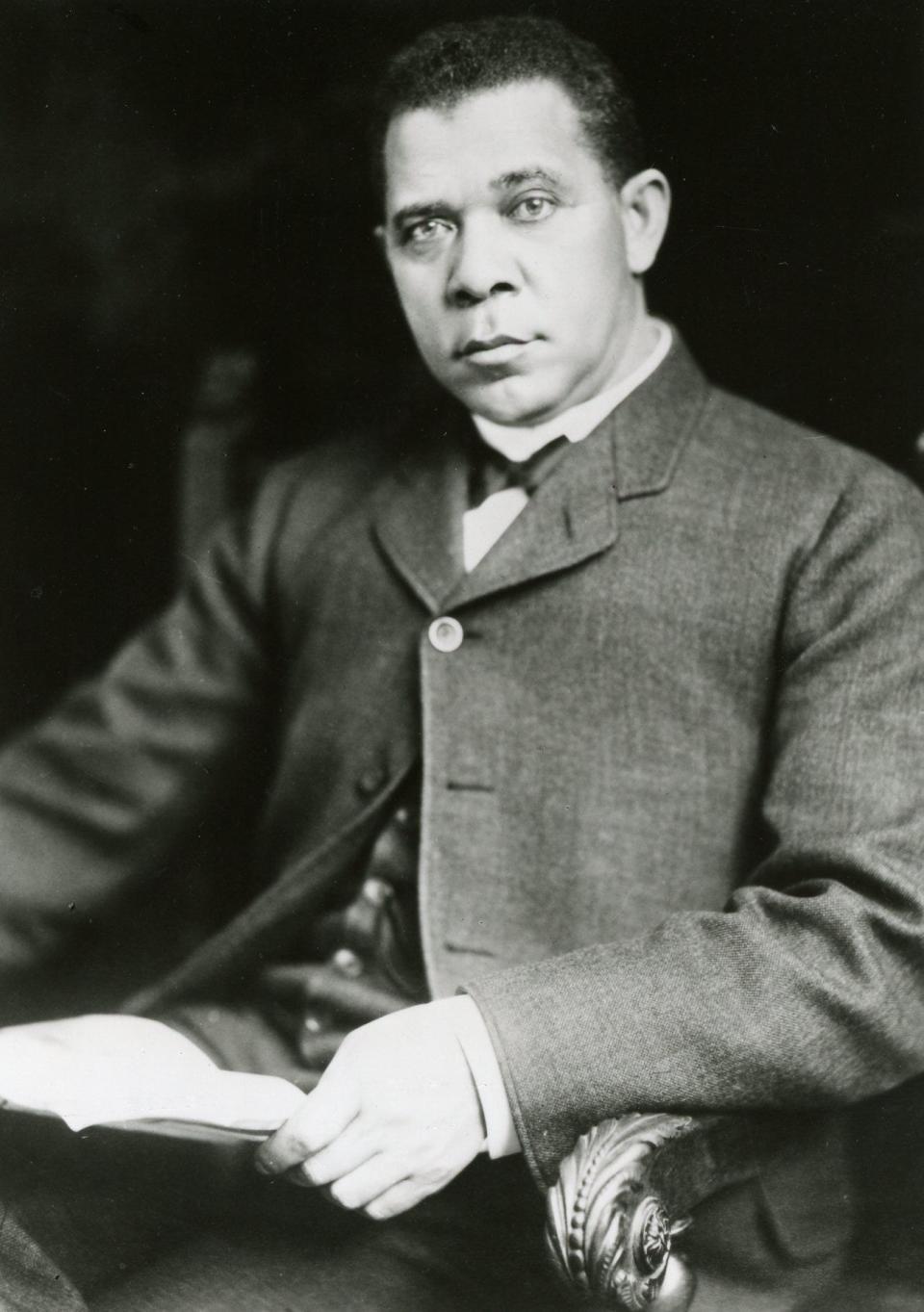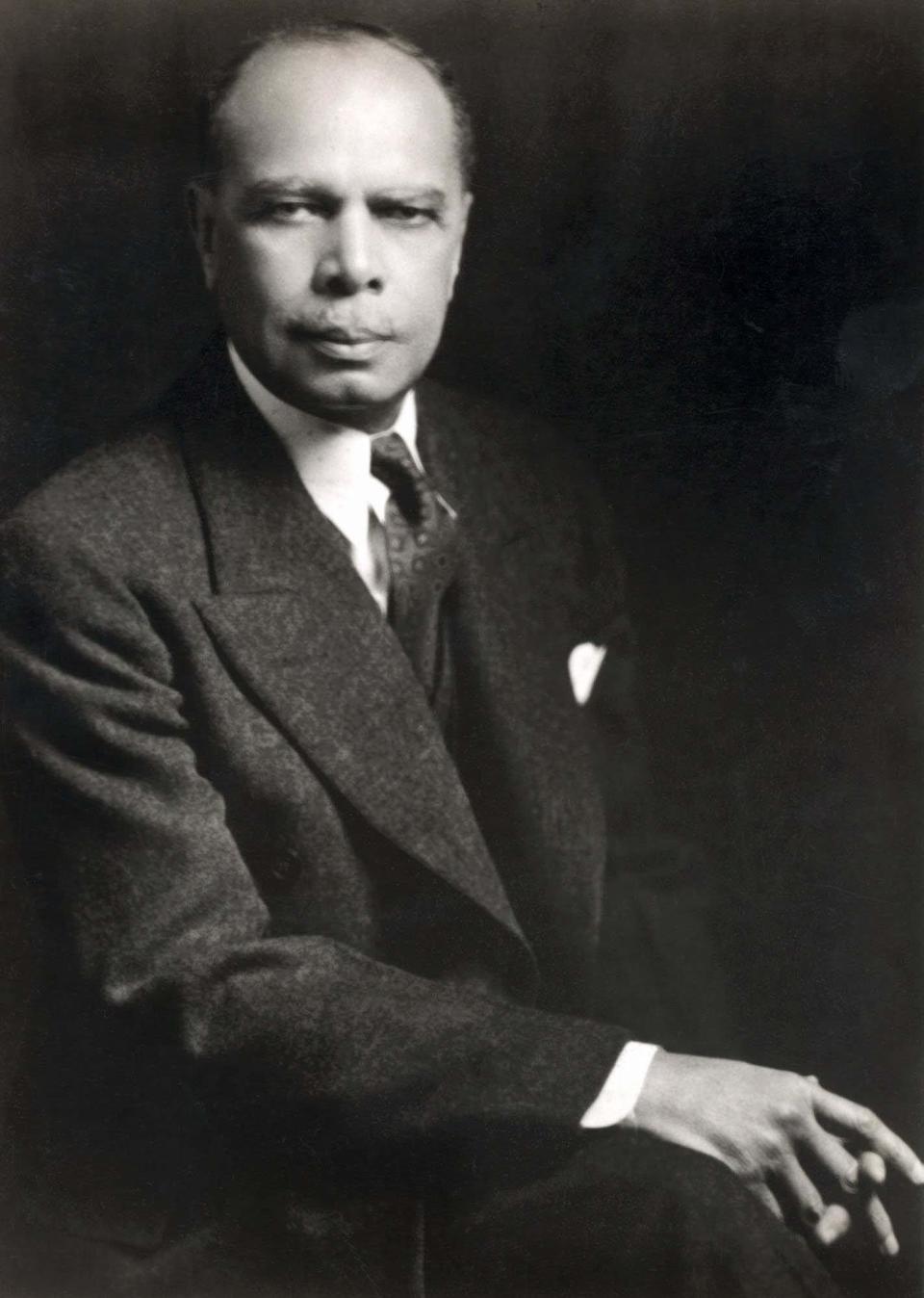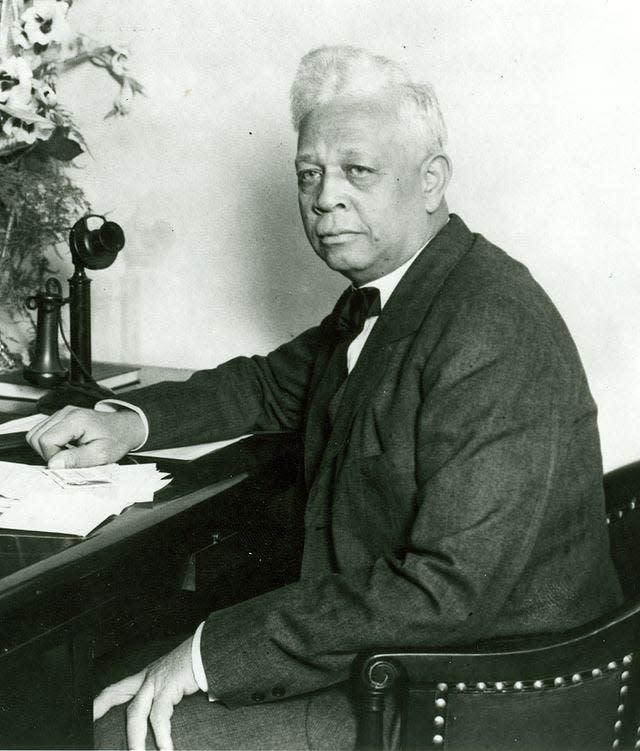Local history: Forgotten civil rights speeches from Akron’s past
The speeches are forgotten, but the messages still resonate.
In honor of Black History Month, we look back at African American orators who spoke in Akron during the late 19th century and early 20th century.
Local history:101 trailblazers who achieved famous firsts in Akron Black history
The visiting lecturers attracted capacity crowds and earned high praise, although their presentations gradually faded from public memory.
Today we welcome those orators back to the stage. Here are excerpts from those long-forgotten speeches in their original words.
The Rev. Broad-Axe Smith
The Rev. Thomas J. Smith, better known as Broad-Axe Smith, lectured Nov. 6, 1891, at Zion Chapel in Akron.
He was the editor of Smith’s Broad-Axe, a Black newspaper in Pittsburgh. According to the Beacon Journal, the lecture “kept the audience in a roar of laughter while its many salient points sowed many seeds of good.”
Support local journalism:6 reasons why you should subscribe to the Akron Beacon Journal
Among Smith’s remarks:
● “There is not a more industrious race in this country than the Negro. ... They raised all the white children in the South, and produced all the cotton and sugar, etc., and yet they say we do not work. They say we are not a religious set of people. I say we are the only genuine Christians in this country.”
● “When the Southern left his home and his family the care of Negroes during the war, they did not pillage and murder, but got down on their knees and prayed the Lord to forgive their enemies. The colored man takes his trouble to the Lord in prayer. They say we’re superstitious. That is true, the whole world is superstitious. I see as many horseshoes over the doors of white people as of our people.”
● “Some colored people would rather reign in hell than rule in heaven to associate with white people. There is not a white church in the city of Akron that wants the colored people to join it. They say they have no objections but you ought to go by yourselves.”
● “Politicians have no use for you unless they can use you. You will never get anything till you band together, push to the front and demand your rights.”
● “The man that knows the most, that owns the most, ought to stoop the lowest to raise the race. God help us to lift and elevate our race.”
Local history:Akron landmarks in Black history
The Rev. D.S. Orner
The Rev. David Samuel Orner, a pastor from Savannah, Georgia, spoke Sept. 8, 1894, at Second Baptist Church.
The Beacon Journal hailed it as “one of the best lectures delivered in this city for some time.”
Among Orner’s remarks:
● “How strange to us the way God chose to make the Negro a race among races. It was in the year 1619 that 14 Negroes were brought to America and sold as slaves, a traffic from which sprang the most momentous consequence, that long rent the Republic with strife and moistened the soil with blood.”
● “When it came time for the great strife, it was not thought best for the Negro to enlist, but he was so eager to flight for his own liberty that they were obliged to allow him to enlist. During that great way, the Negro proved as true as gold.”
● “Today he is pushing to the front. To say that he has not made mistakes would be untrue, but it must be admitted that we have done well. How could we help making mistakes when we were so ignorant that we could not even read the laws. The Negro has certainly risen but you must not measure him by his white brother, who has had all these centuries start of him, but you must measure him from whence he came.”
● “We have indeed a bright future but there is also a dark side. There is still a great work to be done, a work that will require manly men and womanly women, guided by the grace of God, to perform. I predict a great figure for the Negro but there is a work that must be done if we ever reach the zenith of our success.”
● “Save your money and get all the education you can and cultivate your best character and you will be bound to be recognized. It has required 30 years to shake the dirty of slavery from us. What will be the result in 30 years more?”

Booker T. Washington
Educator and author Booker T. Washington, founder of the Tuskegee Institute in Alabama, spoke Sept. 19, 1909, at First Congregational Church and Wesley Temple.
The crowds were so large that many people had to be turned away.
In introducing the speaker, U.S. Sen. Charles Dick, R-Akron, proclaimed: “I know of no better work being done anywhere for God or humanity and for country than his.”
Among Washington’s remarks:
● “I was born in slavery on a Virginia plantation about 1858 or 1859, just exactly when or where I have never been able to find out. My earliest recollection is of living in a cabin with my mother. I remember the day at the close of the war when we were called to the master’s house, and a paper was read to us by a man on the veranda. My mother leaned over and told me that we were free.”
● “Some people think that my idea is to sacrifice the needs of the white man for the Negro. But that has not been my view of the matter. I want to help everyone, regardless of his color or race.”
Local history:Akron’s Candy Man was a sweet soul
● “There are 10 million Negroes in this country. I’ll tell you frankly that it is the one great problem of the day. It is not their fault that they were dropped down among the white race. They are not degrading, just ignorant. All they need is education of the right kind.”
● “That is why we have the Tuskegee Normal and Industrial Institute for colored people. We have educated 12,000 Negroes and all but one have become fine citizens. That one is the only Negro from our school that ever saw the interior of a prison.”
● “I thank God that I belong to a race with a problem before it. If I could return to the spirit world and have the choice of the form in which I could return to the world, I would say: ‘Make me an American Negro.’ ”

James Weldon Johnson
James Weldon Johnson, executive secretary of the NAACP, spoke before a multiethnic audience May 3, 1925, at Second Baptist Church.
Among his accomplishments, Weldon wrote the lyrics for “Lift Every Voice and Sing,” often referred to as the “Black national anthem.”
Among Johnson’s remarks:
● “The Negro is not contending for radical things nor does he talk of overthrowing the government. But he does want to hold the rights he has and fight to attain the rights he has been denied in order to be assured of safety of life and property, justice in courts, right to cast his ballot, and an equal share in public school funds.”
● “Give the Negro a fair chance and the common rights of American citizenship and he will solve the larger part of his problems for himself. There is northing alien about the Negro.”
● “It is up to the democracy, Christianity and common decency of America to see that laws and privileges written into the Constitution are enforced. We Negroes feel that we have a just right to and intend to secure full and unlimited American citizenship for ourselves and for those who come after us.”
● “In many states, our late alien enemies have better protection than loyal American Negroes. We must either achieve full citizenship or we will be forced down into permanent secondary status. The task is difficult.”
● “Education alone does not solve the problem. We get money, but that doesn’t do it. We vote, but even in Ohio we still have some problems. No Negro is safe anywhere so long as a Negro in Mississippi can be outraged and defrauded of his rights. Of what good is money or education if we are denied the common rights of citizenship?”

Oscar DePriest
U.S. Rep. Oscar DePriest, R-Chicago, the first African American to be elected to Congress in the 20th century, spoke May 26, 1929, at Second Baptist Church.
The NAACP sponsored the talk before a predominantly Black audience. Akron Mayor G. Lloyd Weil welcomed the congressman in brief remarks but then left.
Among DePriest’s remarks.
● “I wish your mayor had not left the room. I wanted to ask him something. There ought to be more Negro policemen, some Negro firemen, clerks in the post office, school teachers. It is up to your people to drive political bargains. Support those men who are for you and try to defeat those who are against you.”
● “I’m a Republican, but I was first born a Black man. Fight for your race, regardless of party affiliations. You’ll get no place without a thorough concrete organization. You have about 12,000 Negroes in Akron, enough to hold the balance of power in elections.”
Local history:Hello, Mr. President! Akron rolled out red carpet for Liberian leader
● “You can elect white men who are friendly to you, if you try. If I didn’t like you, I wouldn’t tell you about your faults. There are just as many scalawags among the white people, in proportion to population, as among the Blacks. And considering the opportunities we have had, I believe we Blacks are a little better than the whites. But, at heart, the white man is good.”
● “The Constitution is the most important document in America. Rights of Negroes are clearly shown in it. Taxation without representation caused trouble in Revolutionary days. Understand, I’m not suggesting another Boston Tea Party, but would like equal representation for my race.”
● “I don’t want more rights for my race than the whites enjoy, and I don’t want the whites to have more rights than we have.”
Mark J. Price can be reached at mprice@thebeaconjournal.com.
This article originally appeared on Akron Beacon Journal: Local history: Forgotten civil rights speeches from Akron’s past

